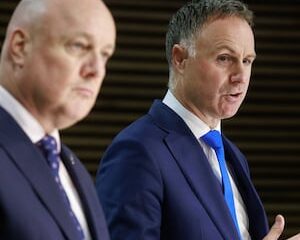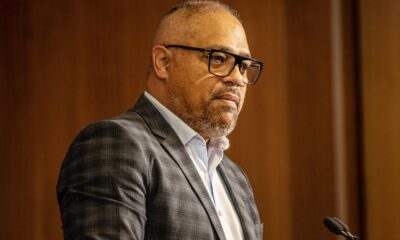Top Stories
Economists Urge New Zealand Government to Revise Economic Strategy

A group of 20 prominent economists has issued a stark warning to the New Zealand government, asserting that its current economic strategy is failing and causing “long-term harm” to communities. Their letter, addressed to Finance Minister Nicola Willis and Prime Minister, highlights significant issues, including rising child poverty, increasing unemployment, and pressure on food banks.
The economists represent a diverse array of backgrounds, including independent experts, union representatives, and academics. They argue that the government’s hands-off approach is neglecting the economic needs of Aotearoa and contributing to a deepening recession. “The policy prescription ordered by your administration is causing long-term harm, and that harm will continue to intensify if the prescription is not changed,” the letter states.
This correspondence follows a similar letter sent nearly a year ago by 15 of the same economists, which was largely overlooked by the government. At the time, Nicola Willis was away, leading to a response from Housing Minister Chris Bishop, who jokingly suggested that she was “more likely to take advice from a penguin” than from economists aligned with Labour. Now, some members of the group refer to themselves as the “penguin economists” and have expanded their ranks to include five additional economists.
Among the signatories are notable figures such as former head of the Productivity Commission, Ganesh Nana, and Susan St John from the Child Poverty Action Group. They are advocating for increased government borrowing and spending rather than further cuts. “It’s definitely not a ‘we told you so,’ it’s very much a call to action for the government to step in and play its much-needed role,” Nana stated.
The letter criticizes the government’s fiscal strategy as lacking a solid economic foundation, claiming it is driven by political motives rather than sound economic principles. Willis responded by acknowledging the importance of dialogue but dismissed the economists’ suggestion that the government should simply increase taxes and spending.
The economists presented a range of troubling statistics to support their argument. Economic growth has declined for nine of the past 15 months, and the economy is now 1.3% smaller than it was at the time of the last election. Additionally, GDP per capita has fallen below its level from June 2022. Unemployment has reached record levels, with over 400,000 New Zealanders seeking jobs but unable to find them. Youth unemployment is particularly concerning, with 42,000 fewer individuals aged 15 to 24 employed compared to recent years.
Food and power prices remain high, and with wage growth stagnating, economists estimate that the average full-time worker is now $1,300 worse off in real terms compared to two years ago. The construction sector has also suffered, with falling investment and a manufacturing output that is smaller than it was a decade ago.
The letter highlights that hardship is becoming entrenched in society, with child poverty expected to increase beyond government targets and homelessness rising. Food banks, too, are struggling to meet record demand.
The economists criticized government savings initiatives, including a reduction of $1 billion in emergency housing spending, which they argue contrasts sharply with the increasing social need. “There is a need for the government to step in,” Nana emphasized. “It’s got to stop its hands-off approach.”
They also scrutinized the government’s two recent Budgets, which they say delivered approximately $23 billion in tax cuts without stimulating growth, while draining resources that could have been allocated to public services. The revenue changes predominantly benefit higher-income earners and capital asset owners, which, according to the economists, does not foster additional economic output.
While they acknowledged the government’s intention behind fast-tracking infrastructure projects, they expressed concerns about the inadequate funding allocated to both new and existing initiatives. They fear such measures could exacerbate social divisions and harm the environment, which are critical issues for future prosperity.
The economists urged the government to develop a comprehensive plan to address poverty, enhance the labor market, and foster an economy focused on high-value production. This plan would require support from various sectors, including business groups, unions, and local communities. They concluded with a hopeful note, expressing a desire for a meeting with either the Prime Minister or Finance Minister to discuss their concerns further.
In her response, Willis reiterated her disagreement with the economists, particularly their proposals for increased taxation and spending. “I don’t agree,” she stated, emphasizing that the previous government’s approach resulted in significant inflation, escalating debt, and structural deficits.
As the economic landscape continues to shift, the call for a reassessment of New Zealand’s economic strategy underscores the urgent need for effective governance that prioritizes the well-being of its citizens.
-

 World1 week ago
World1 week agoPrivate Funeral Held for Dean Field and His Three Children
-

 Top Stories2 weeks ago
Top Stories2 weeks agoFuneral Planned for Field Siblings After Tragic House Fire
-

 Sports3 months ago
Sports3 months agoNetball New Zealand Stands Down Dame Noeline Taurua for Series
-

 Entertainment3 months ago
Entertainment3 months agoTributes Pour In for Lachlan Rofe, Reality Star, Dead at 47
-

 Entertainment2 months ago
Entertainment2 months agoNew ‘Maverick’ Chaser Joins Beat the Chasers Season Finale
-

 Sports3 months ago
Sports3 months agoSilver Ferns Legend Laura Langman Criticizes Team’s Attitude
-

 Sports4 weeks ago
Sports4 weeks agoEli Katoa Rushed to Hospital After Sideline Incident During Match
-

 World2 weeks ago
World2 weeks agoInvestigation Underway in Tragic Sanson House Fire Involving Family
-

 Politics2 months ago
Politics2 months agoNetball NZ Calls for Respect Amid Dame Taurua’s Standoff
-

 Top Stories2 weeks ago
Top Stories2 weeks agoShock and Grief Follow Tragic Family Deaths in New Zealand
-

 Entertainment3 months ago
Entertainment3 months agoKhloe Kardashian Embraces Innovative Stem Cell Therapy in Mexico
-

 World4 months ago
World4 months agoPolice Arrest Multiple Individuals During Funeral for Zain Taikato-Fox


















